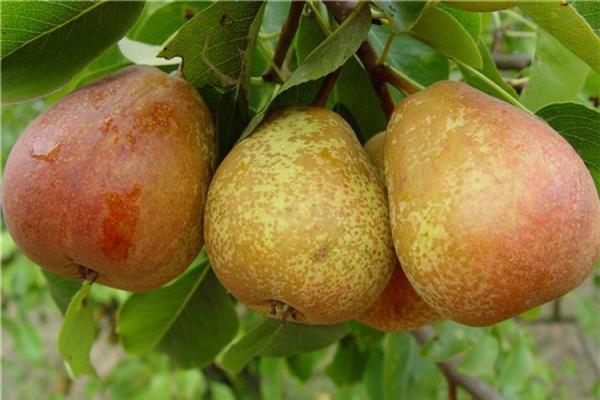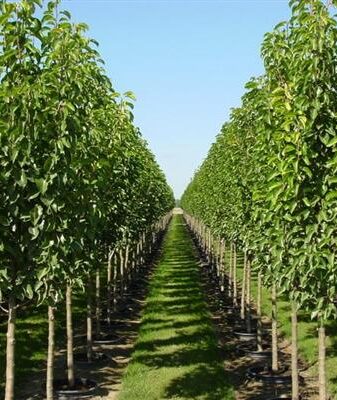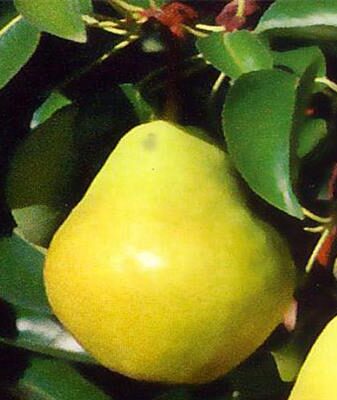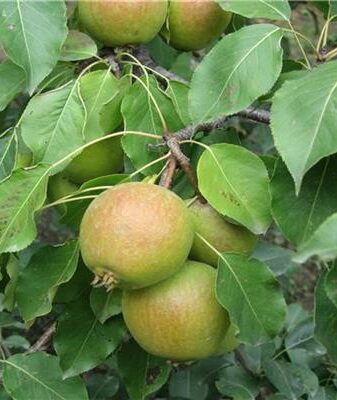Pear Kuban
Content:
The Kuban pear was bred by Russian breeders, moreover, relatively recently. It is recommended to grow it in the south of Russia, namely in the Krasnodar and Stavropol Territories; you can also plant this amazing crop in the Rostov Region.
Pear Kuban: variety description and characteristics

Pear Kuban: photo of the variety
The Kuban pear is considered a winter variety, the trees are always medium-sized, the crown shape of the plants is irregular, the density is average. Shoots are located quite conveniently, they grow mainly vertically at a slight angle to the trunk. They are also mainly directed vertically. The bark of the plant is scaly gray, the culture always bears fruit abundantly and annually, therefore gardeners are very fond of this variety. The shoots of the late pear tree of the Kubanskaya variety are not very thick, the bark on them is brownish brown, and there are practically no lentils. The buds of the plant are conical in shape. The foliage is medium, oval, ovoid, slightly pointed, of a beautiful green color. The leaf plates are flat, shiny and smooth, drooping, dark, petioles are long and thin. The flowers gather in beautiful inflorescences, the petals resemble a bowl, the pear always blooms profusely, but there is no smell from the flowers.
Pear Kuban: features of the variety
Pears variety Kubanskaya late in size are medium, small, the mass of one fruit is usually within the range of 100-150 g, they are correct in shape, the surface of pears is beautiful, slightly rough, not wet. When the pears reach technical ripeness, they turn green with a tan on one side. The subcutaneous points are poorly visible, the seminal chambers are small, closed in shape. The pear is attached to the shoots with the help of stalks, which are curved, their cups are open, not falling off. There are many seeds in fruits, they are usually of medium size, ovoid in shape, rather wide, dark brown. The pulp of the Kuban pear variety usually has a greenish yellow tint, quite dense and juicy, tender to taste, sweet and sour, very aromatic. Pears contain dry substances, sugars, acids, as well as other useful substances and trace elements, so these fruits can and should be eaten, they have a beneficial effect on the body. You can harvest at the end of September, pears look very beautiful on the branches when they reach technical ripeness. These fruits are stored for a long time.
Many gardeners note that the late Kuban pear, subject to storage rules, can lie almost until the end of winter. It is best to store them in a cool place, if you do not have a basement, then you can use a refrigerator, there they will not lose their taste and marketability. It is also easy to transport the product over long distances. Kuban pears can be eaten fresh, as well as processed, they make an excellent compote, jam, and some housewives are very fond of drying these fruits. Therefore, these fruits are truly versatile. The crop begins to bear fruit most intensively at the age of six. As we noted earlier, plant productivity is high. Often, the Kuban pear variety is grown on an industrial scale, and up to 200 quintals of ripe and aromatic fruits are obtained from one hectare.
Pear Kuban: advantages and disadvantages
Of course, any culture has its advantages and disadvantages, the Kuban pear also has them. If we talk about the advantages, then it should be noted the excellent winter hardiness of plants, as well as a good and stable yield.Also, the Kuban pear late drought-resistant, so trees can do without water for a long time, an undoubted advantage is the taste of fruits, as well as their versatility. And if we talk about the shortcomings, then we must say about the relatively small size of the fruits. As we noted earlier, usually the mass of one Kuban pear reaches no more than 150 g. As we can see, this variety has more advantages than disadvantages, which is why gardeners love it so much.
Conclusion
The Kuban pear is considered not demanding on growing conditions, it can be planted on different types of soil, but it is best, of course, to grow plants on light, well-drained soils. Also, this variety of Kuban pear is considered quite resistant to many diseases, pears are winter-hardy, undemanding to pruning and fertilization. The Kuban pear feels great in different regions of our country.




